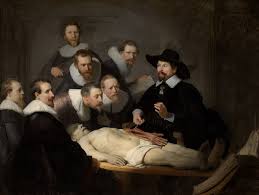Reflections on history of medicine returns to McGovern
 Medical students looking to enhance their knowledge and perspectives on the history of contemporary medicine are encouraged to enroll in the upcoming “Reflections Based on the History of Medicine,” elective, beginning Oct. 5.
Medical students looking to enhance their knowledge and perspectives on the history of contemporary medicine are encouraged to enroll in the upcoming “Reflections Based on the History of Medicine,” elective, beginning Oct. 5.
Instructed by Adan Rios, MD, professor in the Department of Internal Medicine, with the collaboration of L. Maximilian Buja, MD, Distinguished Teaching Professor in the Department of Pathology and Laboratory Medicine; Joshua Samuels, MD, professor in the Department of Pediatrics; and Eugene Boisaubin, MD, professor of internal medicine; the 12-lecture course begins with a discussion of the Theory of Evolution and its relevance to the practice in medicine.
The course has added two new lectures for 2022-23, one on a historical perspective on pandemics and another on the role of physics as a discipline in the development of medicine. Each lecture will be held via Cisco Webex. The course is open to all students, with walk-ins accepted and encouraged. Students will be required to attend eight of the 12 lectures and provide an evaluation of each one to receive credit.
For Rios, teaching these historical reflections with an emphasis on establishing context for modern medical students is an area in need of more attention. While medical schools do place importance on the curriculum for other needed issues, providing a historical perspective strengthens the curriculum content.
“It can be argued that lacking a historical perspective takes away from professionals having context for the ideas and concepts introduced to them throughout their curriculum: the principles that have guided the profession of medicine,” Rios said. “The course aims to highlight different aspects of what medicine is a profession and how it has reached its current state in modern society.”
Students can use the foundation to build an understanding of how others in the past have contributed to different fields of medical development.
“I know that because of the constraints of time, we don’t need to go back to prehistoric times, as that’s too remote for daily life, but learning about the modern origin of the scientific method, for example, is important,” Rios said. “It’s worth it to know where we came from and how we, as physicians, come to the conclusion that this is the way we want to practice science.”
To register for the course, email Rios at Adan.Rios@uth.tmc.edu.
Course Schedule
Oct. 5, 2022 – Dr. Adan Rios
The Evolution Theory: Does it matter to medicine?
This lecture will bring forward a contemporary view of the Theory of Evolution within the framing of the practice of medicine and how its application can profoundly impact its practice.
Oct. 12, 2022 – Dr. Adan Rios
William Harvey and Critical Thinking
A discussion of the Scientific Method using William Harvey’s discovery of circulation as a base for it. The discussion also includes a historical reflection on the concept of Critical Thinking.
Oct. 19, 2022 – Dr. Adan Rios
Pasteur, Koch, and the building of the Panama Canal
This lecture takes us from the development of the Germ Theory, to “pasteurization,” to anthrax, and rabies vaccines culminating with the work of Dr. William Gorgas during the building of the Panama Canal.
Oct. 26, 2022 – Dr. Adan Rios
From a mold to an antibiotic: The penicillin miracle
Wrapped in popular mythology, the true story of how the penicillin miracle happened is alluring and fascinating.
Nov. 9, 2022 – Dr. Eugene Boisaubin
The role of the Civil War in the development of contemporary surgery
This lecture is a panoramic view of how Civil War surgery influenced the contemporary practice of medicine and in particular surgery.
Nov. 16, 2022 – Dr. L. Maximilian Buja
The history of contemporary cardiovascular surgery
Drawing from accounts obtained from primary sources, this is a glass through which we can see the seeds of today’s cardiovascular surgery and develop an appreciation for a past that lives in the present.
Dec. 7, 2022 – Dr. Joseph Samuels
The history of renal dialysis
The history of renal dialysis offers a panoramic view of how dialysis and renal transplants have changed the practice of medicine and the enormous impact this has had on the transplantation of organs.
Dec. 14, 2022 – Dr. Adan Rios
The molecules of life: DNA, physics, and the birth of molecular biology
This lecture discusses the impact of the discovery of DNA and its evolving applications in contemporary medicine. A must for anyone involved in health care.
Jan 4, 2023 – Dr. Adan Rios
The Institutional Review Board (IRB): The genesis of the protection of human subjects from unethical experimentation
This lecture describes how IRBs came to be and how, despite some of the flaws that have accompanied their creation, have become important regulatory bodies for the advancement of clinical research.
Jan. 11, 2023 – Dr. Adan Rios
Pandemics: Back to the future
“There have been as many plagues as wars in history, yet plagues and wars always take us by surprise.” – Albert Camus in The Plague
This reflection by the Nobel Literature Prize winner accurately sums up the past and present times.
Jan. 18, 2023 – Dr. Adan Rios
From Democritus to Newton to Einstein to Planck: How physics continues to transform the practice of medicine
Physics is mostly known for giving man the capacity for ultimate destruction. Nonetheless, many benefits in medicine have come from an understanding of physics laws and principles. An overview of the physics world imbibed with hope for the future.
Jan. 25, 2023 – Dr. Adan Rios
Splendid Solution: Jonas Salk and the polio vaccine
The archetypal life of Jonas Salk will be used to illustrate, in one individual, the summation of many of the sweeping themes that make medicine one of the greatest professions in the history of mankind.